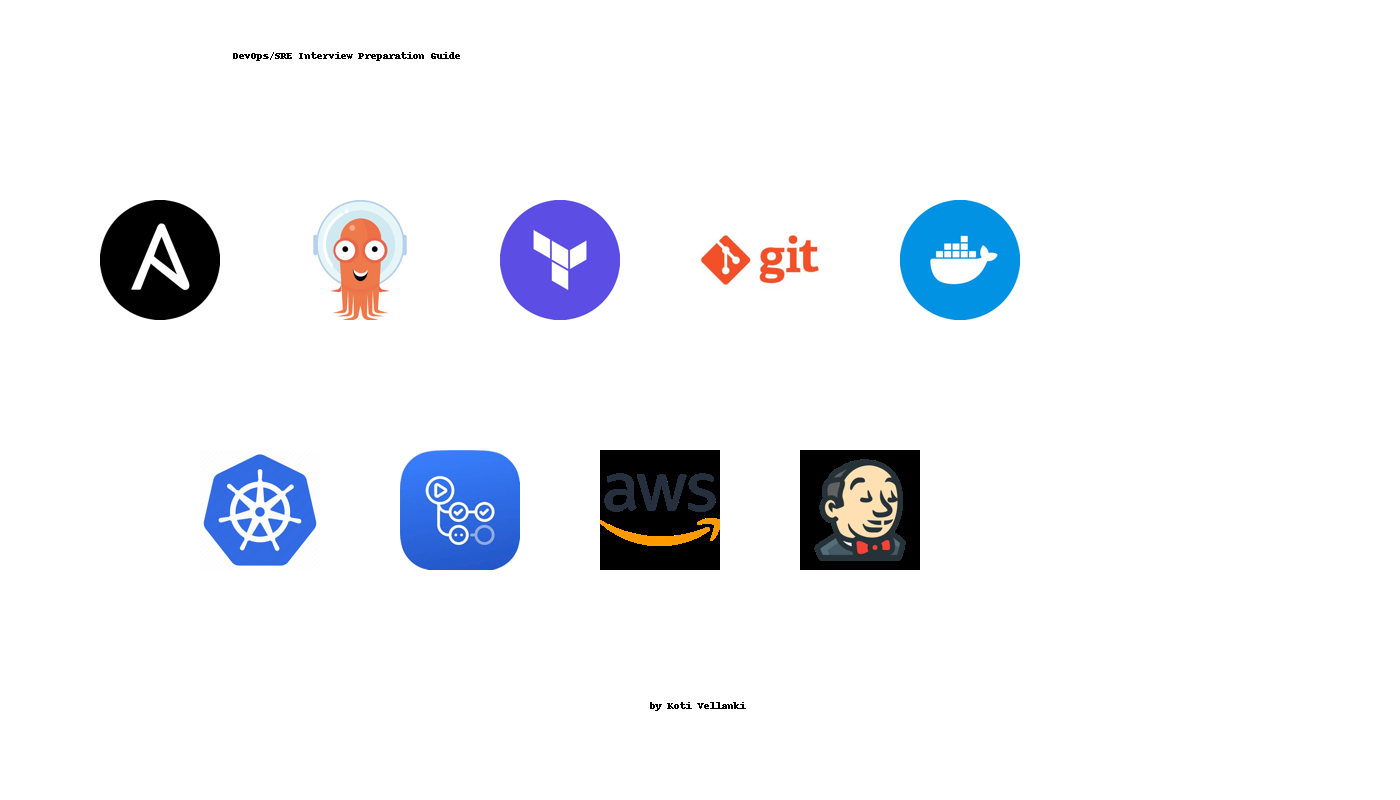Day Zero: The DevOps/SRE Interview Preparation Journey
 Koti Vellanki
Koti Vellanki
DevOps Engineers play a crucial role in modern software development by automating processes, creating resilient cloud infrastructures, and maintaining system efficiency. Preparing for DevOps interviews can feel overwhelming due to the wide array of tools, technologies, and concepts to learn. However, there's no need to stress! This comprehensive 15-day guide is designed to elevate you from a DevOps novice to a self-assured, interview-ready expert.
Our journey begins with Day Zero—the prelude to our deep dive. We’ll outline what you can expect to learn, the tools we’ll cover, and the scenarios we’ll tackle. This high-level plan will ensure that you’re equipped with practical skills and knowledge to handle any DevOps/SRE interview confidently, whether you’re just starting or looking to switch roles.
Why This Guide?
Comprehensive Coverage: We’ll cover Git, Jenkins, Ansible, Docker, Kubernetes, Terraform, GitHub Actions, AWS, and ArgoCD—the must-have tools for any DevOps Engineer.
Hands-On Focus: Each day includes real-world scenarios, hands-on labs, and scripts to practice.
Interview-Ready Content: For every tool, we’ll explore potential interview questions and answers, including scenario-based questions to test your practical knowledge.
Easy-to-understand: Explanations will be so simple that even a non-technical person or a school kid could grasp complex topics with ease.
Real-World Projects: We’ll leverage popular GitHub repositories and AWS cloud setups to simulate real-world DevOps environments.
The 15-Day Roadmap
Here’s a sneak peek into what we’ll cover each day. Think of this as a masterclass that will set the foundation for a lifetime of success in DevOps engineering.
Day 1: Version Control with Git
Overview: Git Basics, Branching, Merging, and Version Control Strategies.
Scenarios: Handling complex merge conflicts, cherry-picking commits, and managing large repositories.
Hands-On: Creating repositories, branching workflows, and advanced Git commands.
Day 2: Continuous Integration with Jenkins
Overview: Building robust CI/CD pipelines using Jenkins.
Scenarios: Setting up multi-stage pipelines, integrating with Docker and Kubernetes.
Hands-On: Creating a Jenkinsfile for a sample NodeJS application, automating deployments to Kubernetes.
Day 3: Configuration Management with Ansible
Overview: Automating server configurations and deployments.
Scenarios: Setting up environments, rolling updates, and configuring cloud resources.
Hands-On: Writing playbooks and roles for real-world applications.
Day 4-5: Containerization with Docker
Overview: Docker fundamentals, image building, and multi-stage builds.
Scenarios: Container orchestration, creating optimized Dockerfiles.
Hands-On: Dockerizing a multi-tier application, building and deploying with Docker Compose.
Day 6-7: Container Orchestration with Kubernetes
Overview: Mastering Kubernetes deployments, services, StatefulSets, and Ingress Controllers.
Scenarios: Setting up blue-green deployments, and managing stateful applications.
Hands-On: Creating Kubernetes manifests, Helm charts, and scaling applications.
Day 8: Infrastructure as Code with Terraform
Overview: Automating cloud infrastructure with Terraform.
Scenarios: Setting up AWS VPCs, EC2 instances, and Kubernetes clusters.
Hands-On: Writing and testing Terraform scripts, and managing state files.
Day 9: GitOps with ArgoCD
Overview: Implementing GitOps practices with ArgoCD.
Scenarios: Continuous delivery with GitOps, setting up ArgoCD for complex deployments.
Hands-On: Managing GitOps workflows, and syncing deployments from GitHub.
Day 10: CI/CD with GitHub Actions
Overview: Leveraging GitHub Actions for automation.
Scenarios: Automating workflows for testing, building, and deploying applications.
Hands-On: Creating GitHub Actions pipelines for a sample application.
Day 11: Monitoring & Observability with ELK Stack
Overview: Implementing logging and monitoring using ELK.
Scenarios: Setting up Kibana dashboards, log aggregation, and alerting.
Hands-On: Building dashboards, analyzing logs for real-world applications.
Day 12: Automating AWS with Python
Overview: Using Python scripts to automate AWS infrastructure.
Scenarios: Managing EC2 instances, S3 buckets, and RDS databases.
Hands-On: Writing Python scripts for AWS automation, integrating with Boto3.
Day 13: Advanced Kubernetes Scenarios
Overview: Deep dive into Kubernetes components, RBAC, and network policies.
Scenarios: Securing clusters, managing multi-cluster deployments.
Hands-On: Implementing best practices for production-grade Kubernetes setups.
Day 14: Complete Real-World DevOps Project
Project: Implementing a real-world project using all the tools learned so far.
Scenario: Setting up a production-ready CI/CD pipeline for a microservices application.
Hands-On: Deploying to AWS EKS, automating with Jenkins and ArgoCD.
Day 15: Final Mock Interview and Review
Mock Interview: Simulate a complete DevOps/SRE interview.
Review: Analyze your strengths and areas for improvement.
Resources: Cheat sheets, quick guides, and best practices for continued learning.
Who Is This Guide For?
DevOps Beginners: Understand each concept from scratch.
Experienced Engineers: Master advanced scenarios and tool configurations.
Career Switchers: Build a solid foundation with practical hands-on examples.
How to Get the Most Out of This Guide:
Follow Daily: Each day builds on the previous one. Make sure to complete hands-on tasks and review the content.
Implement & Practice: Use the hands-on examples and GitHub repositories to get practical experience.
Ask Questions: Don’t hesitate to explore topics deeply and clarify your doubts.
Tools & Technologies We’ll Cover
Version Control: Git, GitHub
CI/CD: Jenkins, GitHub Actions
Configuration Management: Ansible
Containerization: Docker, Docker Compose
Container Orchestration: Kubernetes, Helm
Infrastructure as Code: Terraform
Monitoring & Observability: ELK Stack, Prometheus, Grafana
Cloud Services: AWS (EC2, VPC, S3, EKS)
GitOps: ArgoCD, FluxCD
Let’s Get Started!
Prepare yourself for an exciting and rewarding journey into the world of DevOps and Site Reliability Engineering (SRE). Starting tomorrow, we’ll dive into Git—the fundamental tool for any DevOps Engineer. Stay tuned and get ready to unlock your potential!
Subscribe to my newsletter
Read articles from Koti Vellanki directly inside your inbox. Subscribe to the newsletter, and don't miss out.
Written by

Koti Vellanki
Koti Vellanki
DevOps Engineer | Speaker | Volunteer | Mentor | Friend